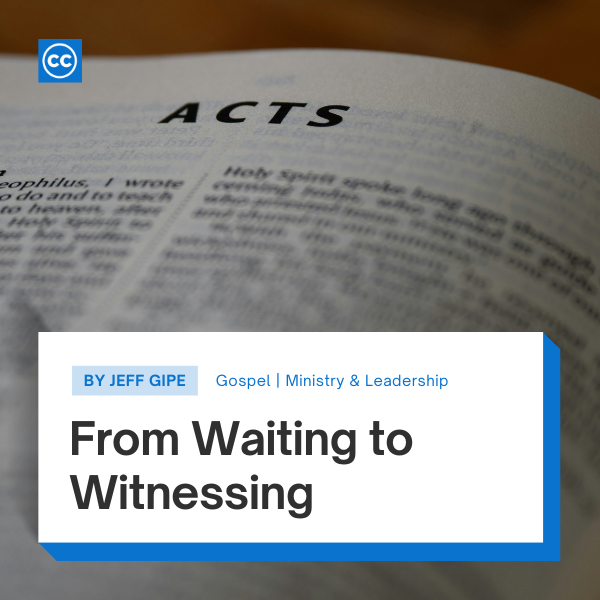
In 1992, I sat in a classroom at the School of Ministry at Calvary Chapel Costa Mesa. Every Friday morning, Pastor Chuck Smith would walk in with his Bible in hand and say, “Let’s turn to the Book of Acts.” I don’t remember him opening his Bible; he didn’t need to. He embodied the Book of Acts.
Pastor Chuck firmly believed that the early church, empowered by the Holy Spirit, was more than just an ancient story—it served as a model for us today. I witnessed this firsthand when Franklin Graham visited Southern California for a men’s conference. Pastor Chuck invited pastors from across the region to a planning meeting. The room buzzed with church leaders eager to strategize. However, when Chuck approached the podium, his agenda was straightforward:
“Let’s pray and wait on the Holy Spirit.”
And for the next hour, that’s precisely what we did. No spreadsheets. No strategy sessions. Just prayer. When the prayer concluded, so did the meeting. Everyone departed, aware that the real work had already begun.
This is what the Book of Acts is all about: not only what the early church did but also what the Spirit of God does through surrendered people today. Jesus’ followers weren’t sent out to change the world in their own strength; they were empowered by the Holy Spirit. That same power is available to us today!
In that simple act of surrender, I caught a glimpse of the Spirit-led rhythm that shaped the early church, a rhythm rooted not in planning first, but in prayerful dependence.
It reminds me of another room, one far more important: the room where Jesus appeared to His disciples after His resurrection. The air must have been thick with anticipation. For forty days, He walked among them, teaching about the kingdom of God. Then, in one defining moment, He gave them a command that would change everything:
“Do not depart from Jerusalem, but wait for the Promise of the Father … for John truly baptized with water, but you shall be baptized with the Holy Spirit not many days from now” (Acts 1:4-5).
The early church’s mission didn’t start with a strategy—it began with surrender. It didn’t begin with movement—it started with waiting. Before they could go out as witnesses, they first had to receive power from on high.
And that same power is still at work today.
I’ve tried to imagine the tension in that room—120 people, shoulder to shoulder, waiting. Their hearts must have been pounding with anticipation. Would Jesus appear again? Would the kingdom be restored? Then, at last, He speaks.
“Wait.”
Waiting Before Witnessing
The wait wasn’t passive; it was preparation for power.
Just 40 days earlier, He had told them to go—to make disciples of all nations (Matthew 28:19). And now, He’s telling them to wait? What might have been going through their minds?
They understood the promise—a promise from a good, good Father who assured them of an even greater gift: the Holy Spirit. Jesus spoke of Him in John 14, and John the Baptist prophesied that He would come, bringing a baptism unlike any before (Matthew 3:11; Acts 11:16). Yet, Jesus’ command was clear: Wait.
Why? Because without the Spirit, they could accomplish nothing of eternal significance.
It’s fascinating that Jesus uses the word baptized. For centuries, people have debated the meaning of being “baptized with the Holy Spirit.” However, in this context, it’s straightforward: just as John immersed people in water, these disciples would be immersed, overwhelmed, and saturated in the Holy Spirit. This wasn’t merely an addition to their faith but a complete transformation.
Living Empowered by the Spirit
Paul later writes in Ephesians 5:18, “Be filled with the Spirit.” The Greek verb here indicated this isn’t a one-time event—it’s continuous. Just as a car doesn’t run forever on one tank of gas, we can’t depend on a single experience of the Spirit. We need His presence daily, moment by moment, to sustain our faith and empower our mission.
Back in that room, the disciples sat on edge, wondering, How long, Lord? One day? Three days? A week? They were eager for the kingdom’s restoration. Their burning question revealed their expectations:
“Lord, will You at this time restore the kingdom to Israel?” (Acts 1:6).
Their hopes were clear. The word restore suggests they were expecting a political and territorial transformation. Their mention of Israel showed they were looking for a national kingdom. It made sense—Jesus had just shared the Passover meal with them, speaking of a New Covenant (Luke 22:20). The prophets had long foretold Israel’s restoration (Jeremiah 23:1-8; Ezekiel 36:16-30; 37:21-28).
But their vision was too small.
They concentrated on their immediate circumstances, their people, and their nation. However, Jesus was calling them to something much greater.
And yet, notice His response—it’s not a rebuke, but a redirection:
“It is not for you to know times or seasons which the Father has put in His own authority” (Acts 1:7).
How often do we, like the disciples, get caught up in what we think God should be doing—restoring our nation, fixing ourproblems, fulfilling our desires—while missing His much bigger mission?
And what’s that mission?
Not a kingdom limited to one nation. Not a restoration restricted to a single group of people. Instead, it’s a global redemption story.
Jesus doesn’t give them a roadmap—He gives them power.
Planning with the Spirit
As mentioned before, the early church didn’t begin with a strategy session; they started with surrender. However, that doesn’t mean strategy is wrong. In fact, thoughtful planning, when rooted in prayer, is essential. The danger isn’t in planning; it’s planning without power. The Holy Spirit doesn’t bypass our minds or efforts; He fills them. We’re called to wait on the Spirit in prayer while relying on Him to lead, direct, and empower every step. Spirit-filled strategy doesn’t replace waiting on God; it flows from it.
Power for the Mission
“But you shall receive power when the Holy Spirit has come upon you, and you shall be witnesses to Me in Jerusalem, and in all Judea and Samaria, and to the end of the earth” (Acts 1:8).
This is the heart of Acts. The word power (dynamis) appears 120 times in the New Testament, always referring to the power of God, Jesus, and the Spirit. This mission wouldn’t be fueled by human effort but by divine empowerment.
The prophet Zechariah said it best:
“Not by might, nor by power, but by My Spirit,” says the Lord of hosts” (Zechariah 4:6).
And that same Spirit dwells in us today, equipping us to go, to witness, and to participate in God’s unfolding story of redemption.
Jesus’ strategy? It begins where you are and grows outward.
- Jerusalem – Start where God has placed you. Be a witness in your home, your family, and your workplace.
- Judea – Broaden your outreach. Engage with your local community and church.
- Samaria – Step outside your comfort zone. Break through cultural and social barriers. Love and serve those who are different from you.
- Ends of the Earth – The global mission. Whether through going, sending, or supporting, we’re called to share the Gospel with all nations.
Jesus didn’t call us to wait for the world to come to us—He called us to go into the world as His witnesses.
From Fear to Boldness
Fear fades when the Spirit fills!
The disciples experienced a radical transformation after Jesus’ resurrection and ascension. Initially, they were uncertain and afraid, hiding behind locked doors. However, everything changed at Pentecost. When the Holy Spirit was poured out, their fear was replaced by boldness, enabling them to step forward as fearless witnesses of the Gospel.
This transformation isn’t unique to them—it’s meant for us too. The Spirit moves us from doubt to faith, from fear to courage, and from passivity to action.
Consider Peter. Just over fifty days before Pentecost, he sat by a fire, denying Jesus three times. But now, filled with the Holy Spirit, he stood before thousands, proclaiming the Gospel. The outcome? Three thousand people believed, were baptized, and received the same Spirit that had transformed Peter.
What happened in Peter is God’s promise to us. We’re not called to be witnesses through our own strength, but by the power of the Spirit.
- The Spirit gives boldness to proclaim the Gospel (Acts 4:31).
- The Spirit provides wisdom in what to say (John 14:26).
- The Spirit brings conviction and transformation (John 16:8).
Called to Be Witnesses
We’re not witnesses because we’re qualified, but because we’re empowered.
The word witness appears twenty-nine times throughout the Book of Acts, and it’s central to the church’s mission. Acts is a story of bold faith, miraculous works, and ordinary people—just like you and me—empowered by the Spirit to change the world.
The word “witness” comes from the Greek word “martyr,” which originally meant someone who gives testimony in a legal or historical sense but later came to be associated with those who testify about Christ, often at great personal cost (Acts 4:20; Matthew 5:16; Revelation 2:13).
Often, we associate “mission” with evangelism. However, not everyone is called to be an evangelist (Ephesians 4:11), but every believer is called to be a witness. As Proverbs 14:25 states, “A truthful witness saves lives.” Your testimony—your life, your story, your experiences with Jesus—is a powerful tool for leading others to Him.
Maybe you feel unworthy to be a witness. You might think, “I’m still figuring things out. I need more training.” But consider Peter. After denying Jesus, he surely felt unqualified. Yet, after being filled with the Holy Spirit, he boldly preached to the same Jewish leaders who had studied the Torah their entire lives. What was their response?
“Now when they saw the boldness of Peter and John, and perceived that they were uneducated, ordinary men, they were astonished. And they recognized that they had been with Jesus.” (Acts 4:13)
If God can use a fisherman who’d just denied Him, He can use you, regardless of your past, doubts, or fears. The only requirement for being a witness is having been with Jesus and being filled with His Spirit.
That’s the key: being with Jesus.
Jesus didn’t say, “You should try to be witnesses.” He said, “You shall be witnesses.” This isn’t a command—it’s a declaration. If we wait for the Holy Spirit, we will receive it, and as a result, we will be His witnesses.
The more time we spend with Jesus, the more we reflect on Him. When we reflect on Him, we can’t help but bear witness to who He is.
“You will be My witnesses in Jerusalem, in all Judea and Samaria, and to the ends of the earth” (Acts 1:8).
Don’t Just Watch—Go
When Jesus ascended, the disciples stood there, staring into the sky. It took two angels to break their trance:
“Men of Galilee, why do you stand looking into heaven?” (Acts 1:11).
In other words, what are you waiting for?
Jesus will return, but until then, there’s work to do. The same question echoes for us today—are we merely admiring Jesus from a distance, or are we stepping into the mission He has given us?
You’ve waited. You’ve been filled. Now go! Because you were never meant to stay staring. You were meant to move, from waiting to witnessing!







